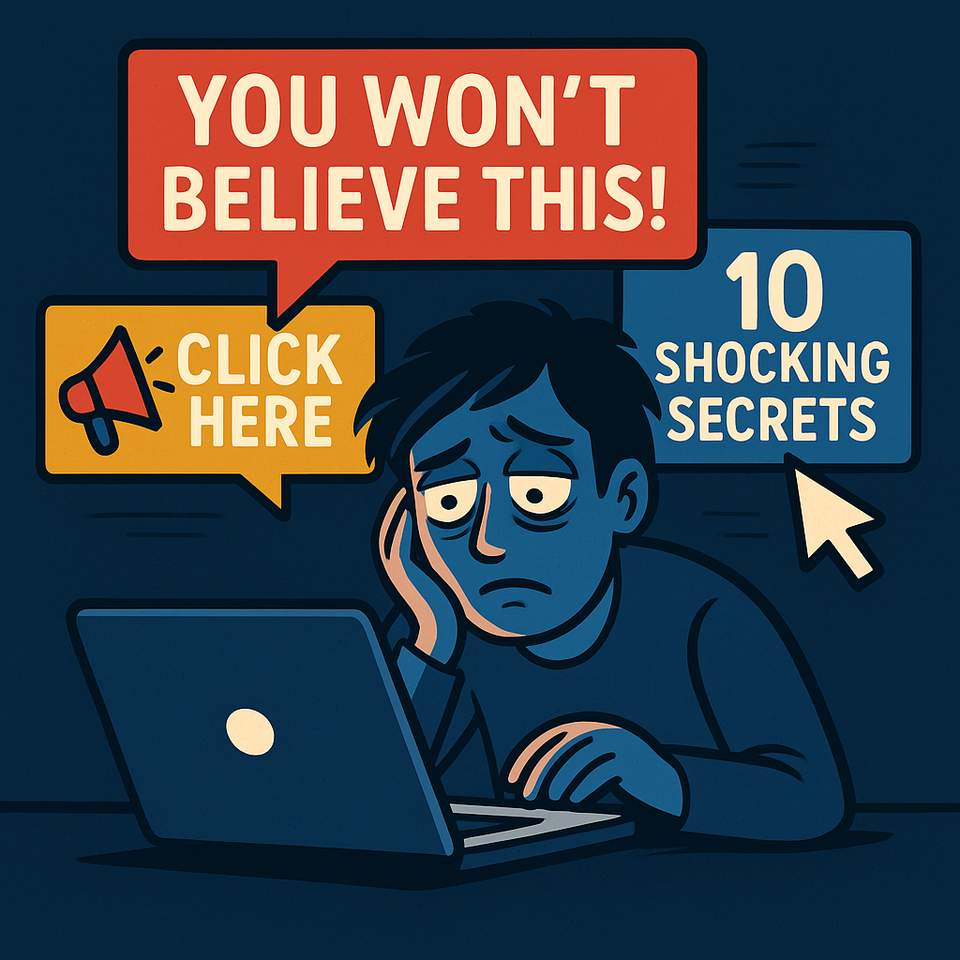It's Clickbait All the Way Down

Picture this: It’s 10 PM on a Tuesday. You’ve got 15 minutes to unwind before bed. You open your browser, thinking, “Just a quick search for that recipe I heard about.” Two hours later, you’re knee-deep in a rabbit hole of “10 Shocking Ways [common ingredient] is Killing You” articles, sponsored “news” about celebrities you’ve never cared about, and endless TikTok reels that autoplay into oblivion.
Your eyes are bleary, your brain is fried, and you’ve accomplished exactly nothing. Welcome to the modern web, my fellow netizen. It’s clickbait all the way down — and I’m exhausted.
If that phrase “all the way down” rings a bell, it’s a nod to an old philosophical anecdote about infinite regress. The legend goes that a scientist was explaining the universe when an elderly skeptic interrupted:
“Nonsense! The Earth rests on the back of a giant turtle.”
Asked what holds up the turtle, she quipped, “Ah, but it’s turtles all the way down!”
That’s the modern internet in a nutshell: not turtles, but layers of clickbait stacked infinitely, with no firm base of truth or value underneath.
You think you’ve found a solid source? Peel back the headline, and there’s another lure beneath, and another, all designed to keep you clicking without ever delivering real substance. Something to think about as we sink deeper into this digital quagmire.
As a regular person who just wants to use the internet without feeling like I’m dodging landmines in a psychological warzone, I’ve had enough.
The web was supposed to be a gateway to knowledge, connection, and efficiency. Instead, it’s become a murky swamp of manipulative headlines, algorithm-driven distractions, and ad-infested sludge that wastes our time and erodes our sanity.
Let me vent about why this is happening, how it’s ruining our daily lives, and why we deserve better.
The Clickbait Trap: Hooks, Lies, and No Payoff

It starts with the headlines. Oh, those headlines.
“You Won’t Believe What Happened Next!”
“SEO is Dead. AI Bots Killed It!”
“Experts Are Stunned by This Discovery!”
“Is This the End of NATO? What Putin Just Did Will Shock You!”
We’ve all fallen for them. I click, hoping for substance, only to wade through 2,000 words of fluff padded with ads, stock images, and unrelated pop-ups. The “shocking reveal” is buried at the bottom — if it exists at all — or it’s just a thinly veiled pitch for some affiliate product.
Take my recent quest for a simple how-to guide on fixing a leaky faucet. Google serves up a top result: “The Ultimate Guide to Plumbing Hacks That Will Save You Thousands” Sounds promising, right? Wrong. The article is a novella of anecdotes, interspersed with “Before we dive in, check out this sponsored tool from our partners!” By the time I reach the actual advice (which is basically “call a plumber”), I’ve lost 20 minutes and gained nothing but frustration. And don’t get me started on the comment sections turned into battlegrounds of bots and trolls.
This isn’t accidental. It’s the rotten fruit of SEO (Search Engine Optimization) gone wild. Content farms churn out AI-generated drivel optimized for clicks, not value. Websites prioritize virality over veracity because that’s what pays the bills in the attention economy. Every view, every second spent scrolling, translates to ad revenue. We’re not users; we’re eyeballs to be harvested.
Social Media: The Infinite Clickbait Scroll
Then there’s social media — the ultimate clickbait vortex. Platforms like Twitter (sorry, X), Facebook, and Instagram are engineered to keep you hooked. Algorithms feed you a never-ending stream of outrage bait: “This Will Make You Question Everything! 🧵” or “Watch This Video Before It’s Banned!” I log in to check on friends, and suddenly I’m doomscrolling through conspiracy theories, viral challenges, and “life hacks” that are totally unrealistic and sometimes downright dangerous.
Even worse, AI generated content is getting so good that my wife who is a very smart, observant person and I are getting into arguments over the authenticity of stupid animal videos popping up on Facebook everywhere.
As a normal netizen with a job and a life, this steals my time in insidious ways. What starts as a five-minute break turns into an hour of mindless engagement. My feed is polluted with “suggested” content that’s not from people I follow but from influencers peddling promises of dopomine that doesn’t even materialize.
Remember when social media was about sharing photos of your vacation? Now it’s a battlefield where truth dies, and billions of human hours are strewn lifeless, never to be used for good and decent ends. Engagement metrics reign supreme, turning us all into unwitting soldiers in the war for attention.
And then: the ads.
They’re everywhere, masquerading as organic content. “From Around the Web: 5 Foods That Melt Belly Fat Overnight!” Click, and you’re tossed into a sales funnel faster than a generic motor oil at Jiffy Lube.
I’ve been in the room when these types of campaigns have been hatched, this is part of why any advertising I would have anything to do with is only for a product that does not induce buyer’s remorse or, worse, misinformation that lingers in the brain like a hangover.
The Hidden Costs: Time, Trust, and Mental Fatigue
Let’s talk about the real toll. I’m not some tech guru or digital nomad; I’m just a guy trying to stay informed, learn new things, and maybe buy a decent pair of shoes online without the fake Amazon reviews.
But the modern web demands constant vigilance. Every search requires sifting through sponsored results, every article needs fact-checking, and every platform wants to gamify my attention with notifications and streaks.
This isn’t just annoying — it’s exhausting.
Studies show we spend hours a day on “unproductive” browsing, much of it driven by clickbait. My productivity tanks because I can’t trust the first five results anymore. Misinformation spreads like wildfire: Remember those “miracle cures” during the pandemic? Clickbait amplified them, and we’re all paying the price in eroded trust.
Worse, it’s a regress all the way down. Even “reputable” sites aren’t immune. Legacy media outlets sensationalize headlines to compete with the noise.
Blogs and newsletters? Many are just glorified email farms luring you in with freebies, only to bombard you with upsells. The web’s foundation which was once built on open information now rests on layers of deception, sponsored by Big Tech’s ad machines.
Skool.com was once a fresh, promising platform — a place where real communities could form, share knowledge, and grow together. But like so many corners of the internet, it didn’t take long for the “gurus” to smell opportunity. First came the self-proclaimed experts promising secret formulas to overnight success. Then came the guru trainers — the people who make their money teaching wannabe gurus how to sell the same dream.
Now the feed is a hall of mirrors: pitchmen pitching to other pitchmen, endlessly recycling the same tactics that hooked them in the first place. The result? An ecosystem where the real value gets buried under layers of hype, funnels, and “limited-time offers,” and newcomers are less likely to find genuine insight than to become the next rung in someone else’s ladder.
Why Does This Happen? Follow the Money
Blame the business model. In the early days of the web, content was king because passion drove it. Now, it’s all about monetization. Google and Meta control the gates, rewarding clickbait with visibility. Creators game the system to survive, churning out quantity over quality. AI tools make it easier to produce endless slop, flooding the swamp even more.
We’re complicit too — our clicks fuel the beast. But as a frustrated user, I didn’t sign up for this. I want the web to respect my time, not exploit it.
Is There Hope in the Swamp?
I’m not saying we abandon the internet (though some days, I fantasize about it). There are glimmers: Tools like ad blockers, reader modes, and curation apps help filter the noise. Substack and Patreon support creators who prioritize depth over clicks. And movements for a more ethical web — think decentralized alternatives or algorithm transparency — are gaining traction.
Personally, I’ve started curating my feeds ruthlessly: Unfollow the baiters, use incognito mode for searches, and set strict time limits. But shouldn’t the system change, not just us?
In the end, the modern web is clickbait all the way down because we’ve let it become that. It’s a reflection of our fractured attention spans and profit-driven overlords. As a normal netizen, I’m tired of the games. Let’s demand better — or at least, let’s stop clicking on the nonsense. Who’s with me?



Comments ()